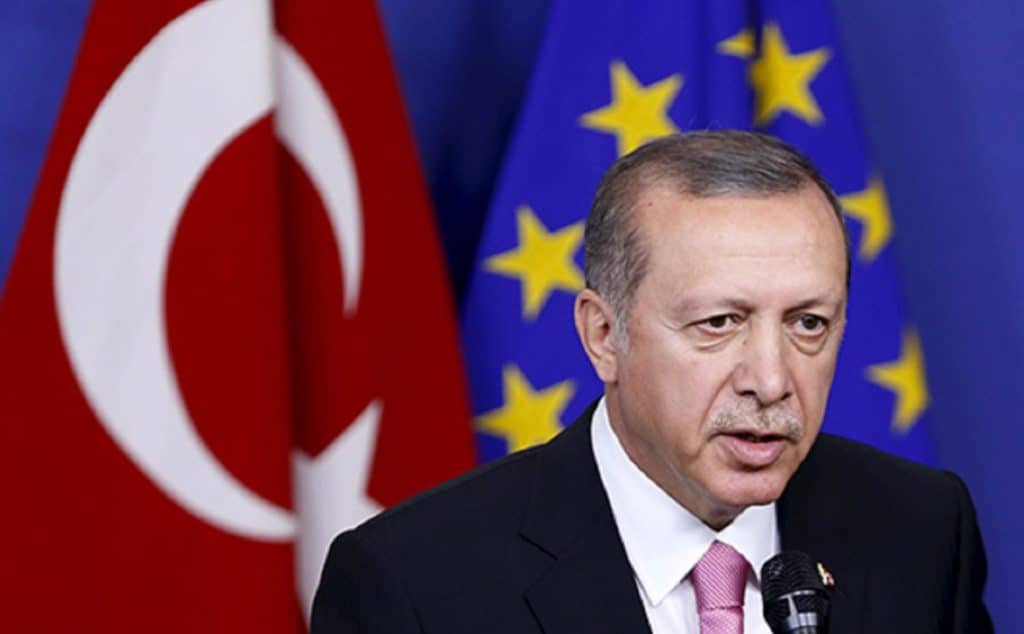World Geostrategic Insights interview with Nilgün Arısan Eralp on the possibility of reviving Turkey’s EU accession process, the current Turkish administration’s real willingness to join the EU, the Turkish public’s perception of the EU, and the perspectives of the immigration package.

Nilgün Arısan Eralp has been working since 2009 as the director of the European Union Studies Center at the Economic Policy Research Institute of Turkey (TEPAV) in Ankara.
Q1 – Turkey has been a candidate for membership in the European Union since 1987. A status officially recognized by the Europeans in 1999. Since then, the prospect of its entry into the European Union has sparked numerous debates related to the country’s size and geographical location, the weight of the Muslim religion in its society, or even its position on the Cyprus issue. And also because of past and current political tensions between Turkey and the European Union, the accession process is at a standstill. Do you think it is still possible to revitalize it? Or will some EU states probably never accept a full membership for Turkey?
A1 – I think it is still possible to revitalize it, but it depends on political developments within the country (toward the restoration and development of democracy, the rule of law, and fundamental freedoms), international conjunctures that will underscore Turkey’s importance, and developments in the EU (whether liberal and social democratic parties will form a majority in member state governments as they did in 1999).
I do not think it is appropriate to say that “some EU states will probably never accept Turkey’s full membership.” I do not think such generalizations are useful. I would rather make a classification:
There have been three points of view in the EU toward Turkey:
– Those who are categorically opposed to Turkey’s membership, no matter what the country does, and who use the current state as an excuse to keep Turkey out forever;
– Those who see Turkey only as a strategic partner with a realpolitik approach, particularly in the areas of security, migration and the economy, and usually turn a blind eye to developments in the country;
– those who always argue that Turkey has the right to become a member as long as it meets the conditions for membership. They were very explicit in supporting Turkey’s accession process during the period of Turkey’s political and economic reforms and are again very explicit in criticizing Turkey during its democratic backwardness.
Q2 – Speaking at the opening ceremony of the 13th Ambassadors’ Conference in the Turkish capital Ankara on Aug. 8, 2022, Foreign Minister Mevlüt Çavuşoğlu reiterated that Turkey is part of Europe and its future lies in the EU, and will continue to work for full membership. “Turkey is Europe,” Çavuşoğlu said, stressing Ankara’s responsibility in ensuring Europe’s security, and reiterating that “we look forward to the integration steps that will accelerate our accession and give us the opportunity to act in relevant policy areas.” What is his opinion? Is EU membership really a realistic and priority goal for the Turkish leadership, despite the strained relations with the West and increasingly close ties with Russia? What are the main drives of Turkish foreign policy toward Europe? What are the EU-Turkey common grounds on which to build? According to the Public Opinion Survey “Turkish Perception of the European Union” 2022, conducted by the German Marshall Fund of the United States (GMF) in 27 Turkish provinces between March 2 and 26, 2022, support for Turkey’s EU membership remains high. Although confidence that Turkey will become an EU member is low, and the belief that Turkey and the EU have conflicting foreign policy interests, 60 percent of the Turkish public is in favor of closer ties with the EU. What is your opinion? Do you also have a feeling that Turkish public opinion is in favor of the EU as a closer partner in international affairs?
A2 – I don’t think the current Turkish administration really wants the country to become part of the EU. It is just rhetoric. Given the current state of democracy, rule of law and fundamental freedoms in the country and the concrete breakdown of values, this goal is neither realistic nor a priority. There is a significant lack of trust between the parties, especially in the field of foreign policy.
For the EU, Turkey is a strategically important neighbor that must be contained. For the current Turkish administration, the EU is needed for economic purposes; it cannot be trusted.
Yes, the Turkish public, especially among the youth, is in favor of the EU, perhaps not particularly as a close partner in international relations, but they believe EU membership would be beneficial. But only 29 percent believe Turkey can ever become an EU member, no matter what it does.
Q3 – Six years after it was signed and with relations between the EU and Turkey strained on other issues, what happened to the EU-Turkey migration agreement reached in 2016?
A3 – The 2016 migration agreement (or migration compromise) was a package deal. The main elements of the agreement include, for example, commitments to:
– Repatriate all irregular migrants who crossed from Turkey to the Greek islands after March 20, 2016, but before being sent back each person will be entitled to an individual assessment. There has been a sharp decrease in the number of people crossing the Aegean Sea irregularly from Turkey to Greece.
– Resettlement of one Syrian from Turkey to an EU member state (mainly Germany) for every Syrian received from Turkey to the Greek islands, with a cap of 72,000 people. This number remained until 2000.
– Eliminate the visa requirement for Turkish citizens by the end of June 2016, provided Turkey meets all conditions of the visa liberalization roadmap by the end of April 2016. Turkey could not meet the conditions on anti-corruption, data protection, judicial cooperation with all member states, enhanced cooperation with EUROPOL, and review of terrorism legislation and practices. Visa liberalization is no longer on the agenda. On the contrary, Turks are finding it difficult to obtain visas from Schengen countries: the refusal rate is around 17 percent, whereas it used to be 4 percent.
– To accelerate the disbursement of the 3 billion euros initially allocated to finance the first set of projects in Round 17 and decide on additional funding of 3 billion euros if necessary. 6 billion was provided to Turkey on a project basis. The projects are aimed at improving the conditions of Syrians in Turkey, particularly in the areas of basic needs, education, health, and integration into the Turkish economy.
– Relaunch the accession process by opening new chapters of accession negotiations as soon as possible. Chapter 17, Economic and Monetary Policy, was opened in late 2015 and Chapter 33, Financial and Budgetary Provisions, was opened in July 2016. At the EU General Affairs Council meeting in June 2018: the Council noted that Turkey has been moving further and further away from the European Union. As a result, Turkey’s accession negotiations have effectively stalled and the opening or closing of other chapters cannot be considered.
Thus, there is no longer the prospect of a migration package. The EU is providing funds (about 2.5 billion euros) to Turkey on a project basis to continue to improve conditions for Syrian refugees in Turkey, especially with regard to basic needs, education, health and integration into the Turkish economy.
Nilgün Arısan Eralp – Director of the European Union Studies Center at the Economic Policy Research Institute of Turkey (TEPAV). She holds a B.S. degree in Economics from Middle East Technical University, M.A. degree in Economic Development from Leicester University and M.Sc. degree in European Studies from London School of Economics







